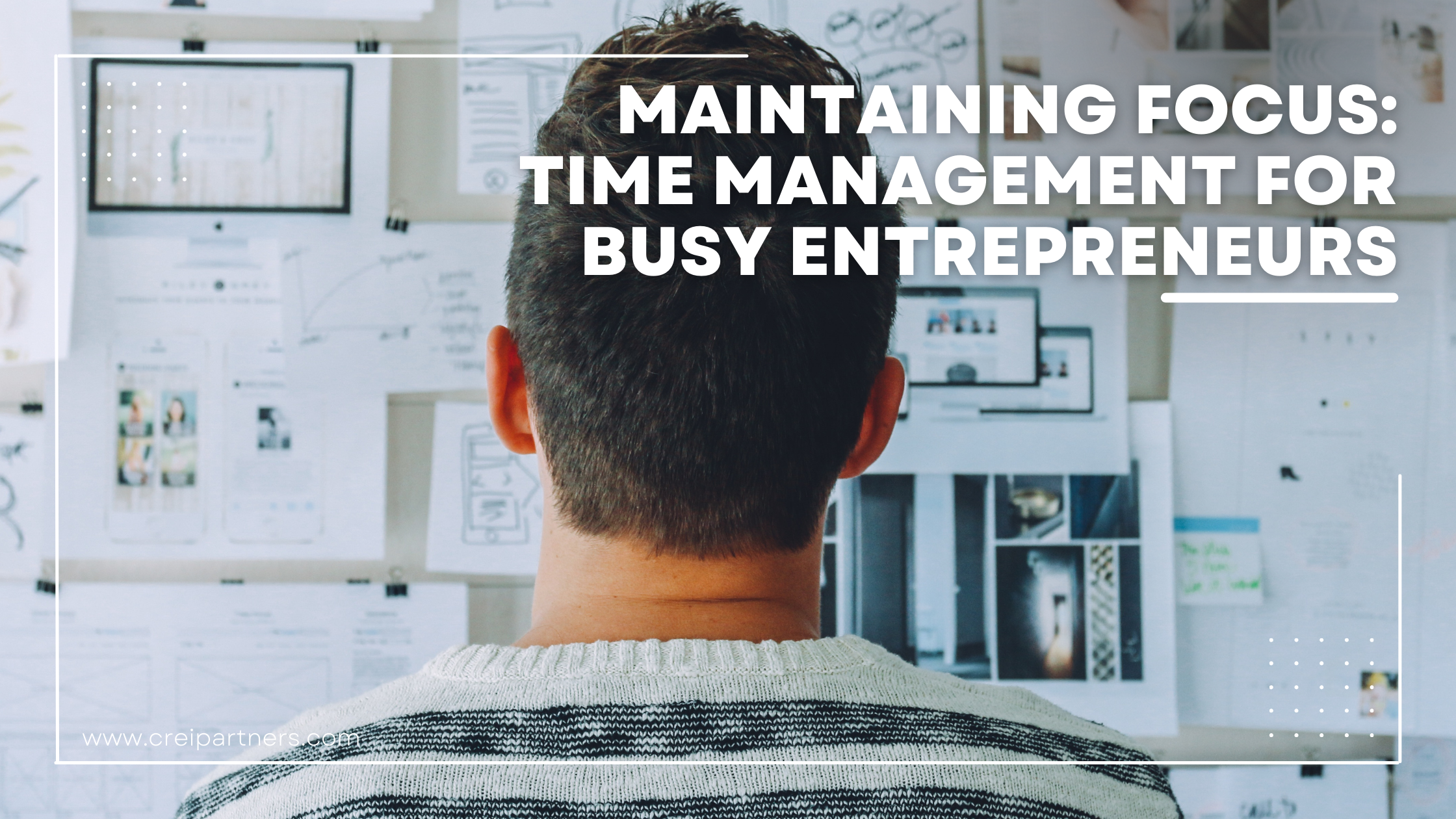It is crucial to optimize focus and time management as an entrepreneur. The hectic, fast-paced lifestyle of a founder running a business makes it easy to become distracted, overwhelmed, and burnt out. After several years of owning CREI Partners, I have found that time management as an entrepreneur requires subtly different techniques than as a W2 employee. Strong systems and routines for managing limited time and mental focus will help you operate more effectively and avoid frustration.
Often, the difference between efficient productivity and floundering is taking a systems approach-let’s discuss ways to avoid wasting time and effort, while maintaining your optimal efficiency and output.
1. Start with Routines
Establish set daily, weekly, and monthly routines that enable you to consistently focus on high-priority responsibilities. I love keeping a list of time blocks and commitments in one place, so that when I sit down to schedule my week or month, I know everything that needs to fit in. Using recurring time blocks on your calendar can also streamline planning essential tasks:
- Strategic planning time: 1-2 hours daily without interruptions to work on long-term goals. Guard this time fiercely. Keep a running list of topics or tasks this time should be dedicated to, for long-term growth.
- Admin time: Schedule 2-3 hours weekly for non-strategic items like emails, paperwork, miscellaneous tasks. Batch these to maintain focus.
- Meetings: Group meetings on specific days so they don’t fragment your week.
- Know what you need: Do you prefer banging out one task after another or having a minute to breathe in between? I like to build timed breaks on the busiest days. This lets me have a moment to regroup and return to work with vigor, while also ensuring that moment doesn’t extend and waste time.
- Buffer time: Building in 15-60 minutes between meetings can give time to regroup, transition focus, take a breather, then prepare for what needs to be accomplished next. However, this time can also easily end up wasted. Remain self-aware and notice how much time you need to reset without frittering away extra minutes waiting for a meeting to start.
Building routines and systems that work for you helps assure you handle recurring tasks without getting derailed daily.
2. Schedule Intentionally
Carefully plan your calendar in advance to thoughtfully direct your time. Avoid double booking and build in buffers. Schedule by priority with focus on:
- Revenue-generating activities: Client meetings, sales calls, new opportunity creation.
- Team leadership and management: Overseeing direct reports, structuring workflows.
- Property management tasks: Proactively and systematically handle recurring tasks.
- Innovation: Product/service development, process improvements.
Look at your calendar weekly and identify any gaps where non-essential activities crop up or time is wasted inefficiently. Replace these with priorities. Evaluate how you spend time daily and eliminate waste, to maximize productivity aligned with priorities.
3. Limit Distractions
Any person, professional, and entrepreneur faces limitless potential distractions these days – emails, notifications, slack messages, meetings – all which fragment focus. How much time do you spend each day getting distracted by answering a text, then refocusing on your task? Minimize this by:
- Turning off notifications during focused work blocks.
- Designating set times to process messages in batches.
- Having assistants triage items that don’t require your input.
- Declining meetings that aren’t a priority use of time.
- Working in locations removed from office interruptions.
- Leaving email and messaging apps when concentrating on important projects.
The ability to focus without distraction for extended periods is a competitive advantage for entrepreneurs. Structure conditions that allow this.
4. Prioritize Ruthlessly for Time Management as an Entrepreneur
Recognize that you will never have enough time as a founder to complete every possible task. You must prioritize intentionally, to ensure your time is spent on the tasks with the most impact. Ask yourself:
- What activities have the biggest impact on key business objectives? Prioritize these first.
- What can only I do in my role versus delegating? Ensure you spend time here.
- What deadlines are upcoming that require preparation time? Make these a priority.
- What tasks create the most value for customers? Focus your energy here.
An effective strategy can be considering whether a task is urgent, important, both, or neither. Just because a task is time sensitive doesn’t make it important. Often, the work that can generate the most income, such as designing new products, does not have time urgency. However, it is easy to see how this can be the most valuable. Learning to say no and foregoing low-priority activities is vital. Be relentless in how you allocate time to the very highest value items with the biggest payoff potential.
5. Evaluate and Adjust
Consistently examine what works or doesn’t work with your approach to time management as an entrepreneur. Every person will have a different rhythm and demands.
- Analyze your schedule, responsibilities, and energy levels to refine your personal system.
- Tools like time trackers can provide helpful analytics on where time goes. Often, intentions can be different from how things play out in real life. Evaluate where your efficiency and planning goals differ from actual behavior.
- Identify patterns you can optimize. Adjust routines and tactics until you find the approach allowing peak productivity and focus.
- Re-evaluate regularly as your business evolves.
Maintaining focus on time management as an entrepreneur, hinges on prioritizing your time wisely. Implementing consistent systems and routines, while minimizing distractions will help you zero in on revenue-generating priorities. With strong strategies in place, you can avoid burnout and operate at your highest level consistently. What practices do you find best enable focus and productivity in your entrepreneurial work?
Additional Resources:
Youtube: Mike Mannino – Mindset Mastery: Goal Setting and Systems for Real Estate Success
Why Should Doctors Invest Passively in Multi-Family Real Estate? » CREI Partners
Consistency, Processes, and Technology in Real Estate with Chris Freeman » CREI Partners


 Subscribe to our newsletter so you never miss out on new investment opportunities, podcasts, blogs, news and events.
Subscribe to our newsletter so you never miss out on new investment opportunities, podcasts, blogs, news and events.